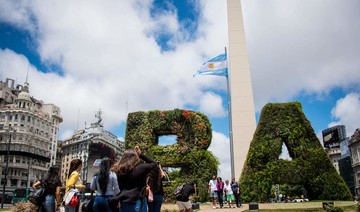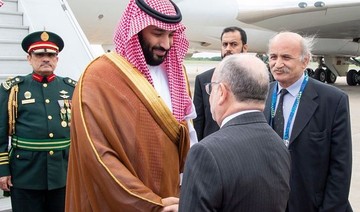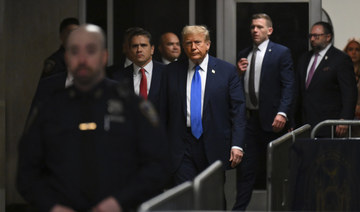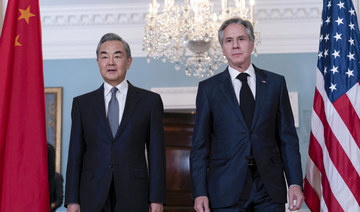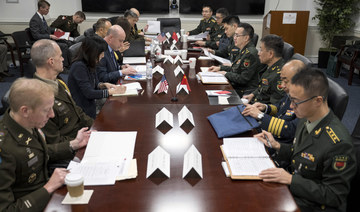DUBAI: The summit of the G20 nations assembling in Buenos Aires comes at a crucial time in world affairs, as well as a critical juncture in the economy of its host nation, Argentina.
For Saudi Arabia too, the meeting comes at an important crossroads – an opportunity to move its economic transformation strategy onto another level in the face of challenges at home and abroad.
While public perception of the G20 is based on the power-play politics on display over the traditional 48 hours of summitry, behind the scenes the gathering is a forum for the resolution of economic and financial issues.
The two days of in-your-face events are preceded by more discreet meetings of business leaders and financial officials — the legendary “sherpas” — from the member countries and their invitees; their discussions are decidedly economic, rather than political; their implicit agenda is to maintain economic stability within the existing financial framework.
Maybe this is why, over the course of the 10-year history of the G20, it has attracted more criticism and opposition from the left wing, and physical opposition from violent extremists, than any other multinational gathering.
The G20 is unashamedly a club of capitalists, even when its most populous member and second biggest economy, China, is still nominally a communist economy. In its decade in the capitalist inner sanctum, China has proven just as orthodox a capitalist as any of the other members, including the standard bearer of free enterprise, the US.
In 2009 at the G20 in Pittsburgh, China joined with the US to bail out the world with an expansionist program after the global financial crisis had led it to the brink, declaring itself a committed member of the club.
How different the atmosphere is in Buenos Aires. The global economic system seems to be on the point of fracture again, but this time there seems little chance of a US-China double act coming to the rescue.
The Costa Salguero Center on the edge of the Rio de la Plata will be the venue for the first meeting between US President Donald Trump and Chinese President Xi Jinping since, earlier this year, the former fired the opening shots in the “trade war” going on between them by declaring his intention to impose $250 billion of tariffs on Chinese imports.
China retaliated with its own tariffs, and there is a danger that the confrontation — which some American officials describe as merely a “skirmish” — will descend into a full-scale battle next year, when the tariffs take effect.
That would have serious consequences for a global economy that is looking increasingly fragile amid concerns that the financial system, too, is laboring under a weight of increased debt and overinflated asset prices.
China recently held out an olive branch, with deputy president Wang Qishan declaring his readiness to enter serious negotiations to avoid a breakdown in the global trade system. The hope is that Trump will hold off formally applying the tariffs in January.
But in Buenos Aires, nobody is expecting too much from the dinner that the two presidents have arranged on Friday night.
By then, the first full day of the summit will have been completed, and President Mauricio Macri of Argentina will be hoping that it has gone off without the major incidents that have been threatened by home-grown and international agitators.
If there was a repeat of the serious football-related violence that broke out in Buenos Aires recently, it would take the shine off his attempts to claim that Argentina had turned a corner in its economic troubles, in the run-up to presidential elections next year.
Macri was elected three years ago in a burst of optimism that his reformist policies would put the Argentine economy on the road to stability after years of boom-and-bust cycles, interspersed corruption scandals, and domestic unrest.
For a while it seemed to be working, and winning the G20 was seen as a mark of approval by the international community for his presidency.
But recently the old Argentine malaise has come back with a vengeance. The peso has lost 50 percent of its value against the dollar this year, Argentine financial markets have been chaotic, and inflation has soared to more than 30 percent per annum. Some Argentinians complain they cannot afford steak.
Macri has stabilized the situation in recent weeks, with the IMF giving its blessing in a series of measures to stabilize the economy and the financial system.
But Argentine citizens are still having to live with an austerity program that threatens their standard of living, and it would not take much for ordinary citizens — the ones who have not taken Macri’s advice to have a long weekend away from Buenos Aires — to join protests that could easily descend into violent confrontation as the G20 leaders meet.
That would be an embarrassment for Macri in front of his fellow leaders, and would also distract from the rest of the very worthy G20 program.
While the media is salivating for a Trump-Xi confrontation on trade, more fireworks on climate change and street protest, the compilers of the G20 program have actually put together a formal agenda that reflects some of the other genuine concerns of the international community.
The theme of the Buenos Aires G20 — as it is the case increasingly with international forums from Davos to Singapore — is sustainability. The world has to live within it means, both in terms of energy, environment, society and finance.
The Argentine G20’s self-declared goals are to focus solutions on the future of work, infrastructure for development, viable food production and consumption, and the inclusion of more women in the global workforce, all against the backdrop of the rapid technological change turning most aspects of the economic process on its head.
That coincides with many of the goals of Saudi Arabia’s Vision 2030, which Saudi policymakers — led by Crown Prince Mohammed bin Salman — will be at pains to stress is still on track in Buenos Aires. The event gives the opportunity to reassert the project’s credentials on the international stage after a period of uncertainty in crucial global energy markets and changes in the international perception of the Kingdom.
Some aspects of the Vision 2030 program — like the initial public offering of Saudi Aramco originally slated for next year — have been modified in line with changing circumstances, and lower oil prices threaten to alter the fiscal mathematics for the Kingdom’s economic policymakers.
As the biggest economy in the Middle East, a leading oil producer and a long-standing member of the G20, Saudi Arabia will retain its role and its influence in Buenos Aires. The top-level delegation will be working hard behind the scenes, at the bilateral and “retreat” events at the summit center, to argue its case among its global peers.
It all promises to be an instructive lesson in the stagecraft, and statecraft, that goes into hosting a G20 summit, which, after a move to Japan next year, is planned to be held in Saudi Arabia in 2020, its first time in the Middle East.
Why the G20 matters now for both Saudi Arabia and the international community
Why the G20 matters now for both Saudi Arabia and the international community
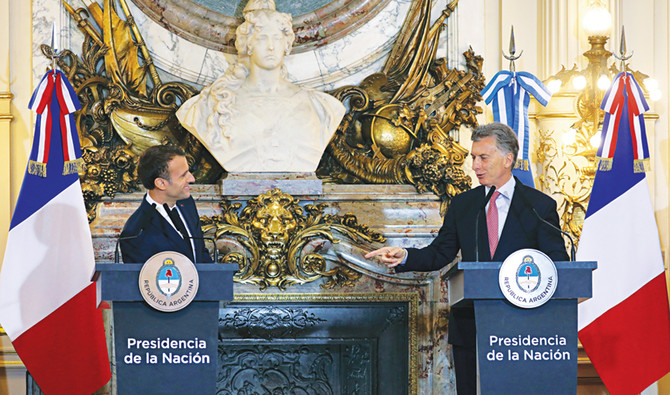
- The world is hoping the US and China will resolve their trade war
- Saudi Arabia will showcase Vision 2030 on the global stage
UK man charged with ‘Russia-backed arson plot’ on Ukraine-linked targets
He is accused of organizing and paying for an arson attack on two units on an industrial estate in Leyton
LONDON: A 20-year-old British man has been charged with masterminding an arson plot against a Ukrainian-linked target in London for the benefit of the Russian state, prosecutors said on Friday.
“Included in the alleged activity was involvement in the planning of an arson attack on a Ukrainian-linked commercial property in March 2024,” the Crown Prosecution Service said in a statement.
Court documents allege that suspect Dylan Earl, from Leicestershire in central England, was connected to the proscribed terrorist group the Wagner Group, the domestic Press Association news agency reported.
He is accused of organizing and paying for an arson attack on two units on an industrial estate in Leyton, east London, on March 20, which required 60 firefighters to bring under control.
The alleged target is referred to as “Mr X” in the charges.
The CPS, which brings prosecutions in England and Wales, said two other men — Paul English, 60, and Nii Mensah, 21 — had also been charged with aggravated arson in connection with the case.
A third, Jake Reeves, 22, had been charged with agreeing to accept a material benefit from a foreign intelligence service as well as aggravated arson.
A fifth man, Dmitrijus Paulauska, 22, has been charged with having information about terrorist acts, the CPS added.
UK Foreign Secretary David Cameron said: “While we must let the judicial process run its course, I am deeply concerned by allegations of British nationals carrying out criminal activity on UK soil to benefit the Russian state.
“We will use the full weight of the criminal justice system to hold anyone found guilty of crimes linked to foreign interference to account,” he wrote on the social media platform X.
Dominic Murphy, head of the Metropolitan Police in London’s Counter Terrorism Command which is leading the investigation, said: “This is a highly significant moment and investigation for us.
“Not only are the charges that have been authorized by the CPS extremely serious, but it is also the first time that we have arrested, and now charged anyone using the powers and legislation brought in under the National Security Act.”
The National Security Act 2023 came into effect in December last year, and was designed to respond to “the threat of hostile activity from states targeting the UK’s democracy, economy, and values,” the government said at the time.
All five suspects are due to appear at the Central Criminal Court at the Old Bailey, London, on May 10.
Wave of pro-Palestinian campus protests in US meets forceful response
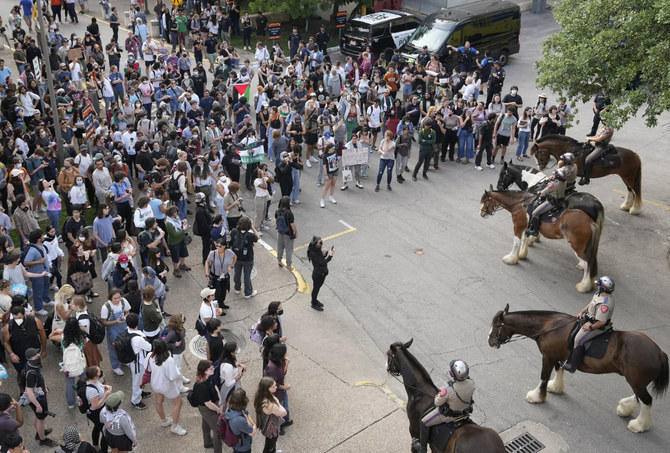
- Fresh clashes between police and students opposed to Israel’s war in Gaza broke out on Thursday
- Questions abound over forceful methods being used to shut down intensifying protests
NEW YORK: Fresh clashes between police and students opposed to Israel’s war in Gaza broke out on Thursday, raising questions about forceful methods being used to shut down protests that have intensified since mass arrests at Columbia University last week.
Over the past two days, law enforcement at the behest of college administrators have deployed Tasers and tear gas against students protesters at Atlanta’s Emory University, activists say, while officers clad in riot gear and mounted on horseback have swept away demonstrations at the University of Texas in Austin.
At Columbia, the epicenter of the US protest movement, university officials are locked in a stalemate with students over the removal of a tent encampment set up two weeks ago as a protest against the Israeli offensive.
The administration, which has already allowed an initial deadline for an agreement with students to lapse, has given protesters until Friday to strike a deal.
Other universities appear determined to prevent similar, long-running demonstrations to take root, opting to work with police to shut them down quickly and in some cases, with force.
Overall, more than 530 arrests have been made in the last week across major US universities in relation to protests over Gaza, according to a Reuters tally. University authorities have said the demonstrations are often unauthorized and called on police to clear them.
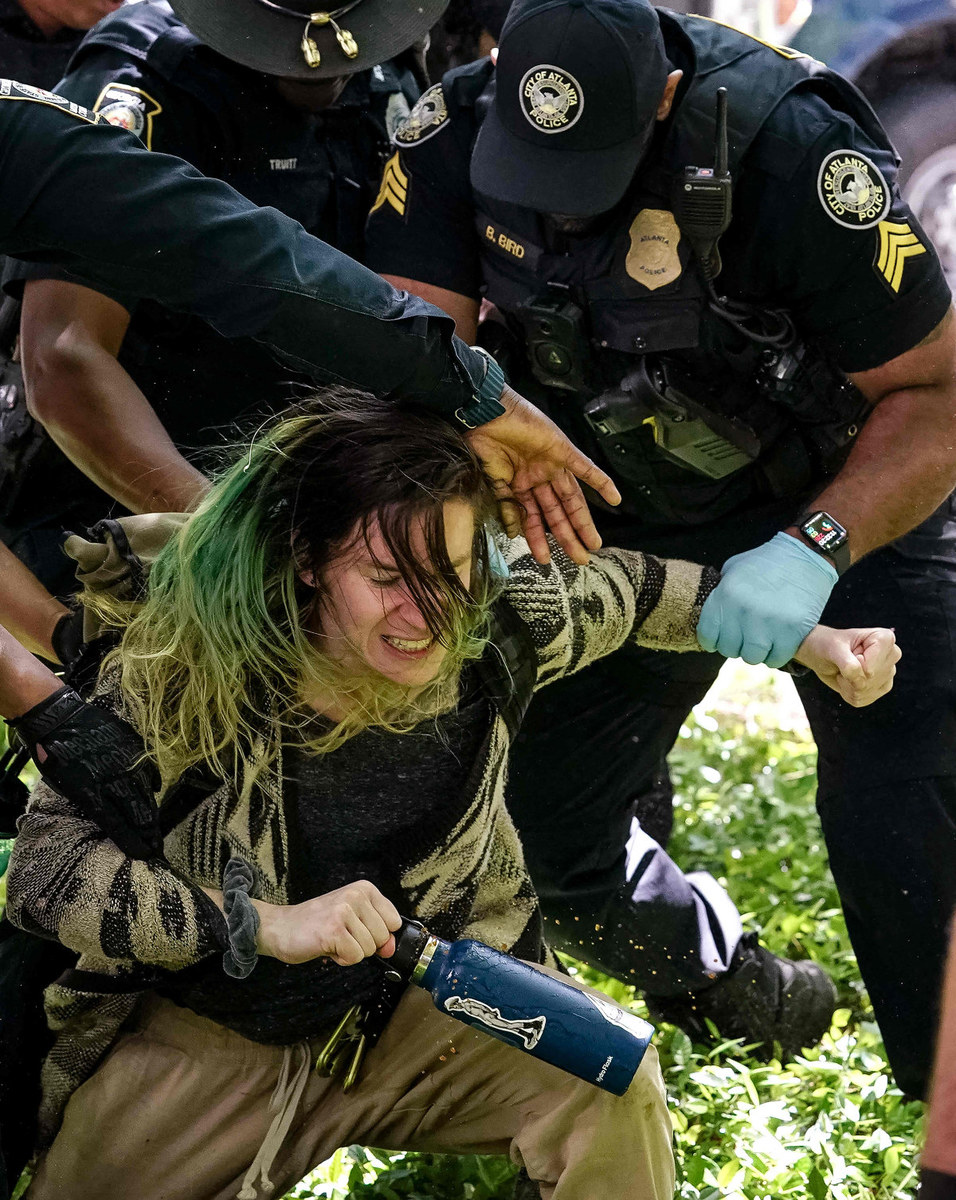
At Emory, police detained at least 15 people on its Atlanta campus, according to local media, after protesters began erecting a tent encampment in an attempt to emulate a symbol of vigilance employed by protesters at Columbia and elsewhere.
The local chapter of the activist group Jewish Voice for Peace said officers used tear gas and Tasers to dispense the demonstration and take some protesters into custody.
Video footage aired on FOX 5 Atlanta showed a melee breaking out between officers and some protesters, with officers using what appeared to be a stun gun to subdue a person and others wrestling other protesters to the ground and leading them away.
“Several dozen protesters trespassed into Emory University’s campus early Thursday morning and set up tents,” the school wrote in response to an emailed request for comment. It described the protesters as “activists attempting to disrupt our university,” but did not comment directly on the reports of violence.
Atlanta police did not immediately respond to inquiries about the number of protesters who were detained or about reports over the use of tear gas and stun guns.
Similar scenarios unfolded on the New Jersey campus of Princeton University where officers swarmed a newly-formed encampment, video footage on social media showed.
Boston police earlier forcibly removed a pro-Palestinian encampment set up by Emerson College, arresting more than 100 people, media accounts and police said. The latest clashes came a day after police in riot gear and on horseback descended on hundreds of student protesters at the University of Texas at Austin and arrested dozens of them.
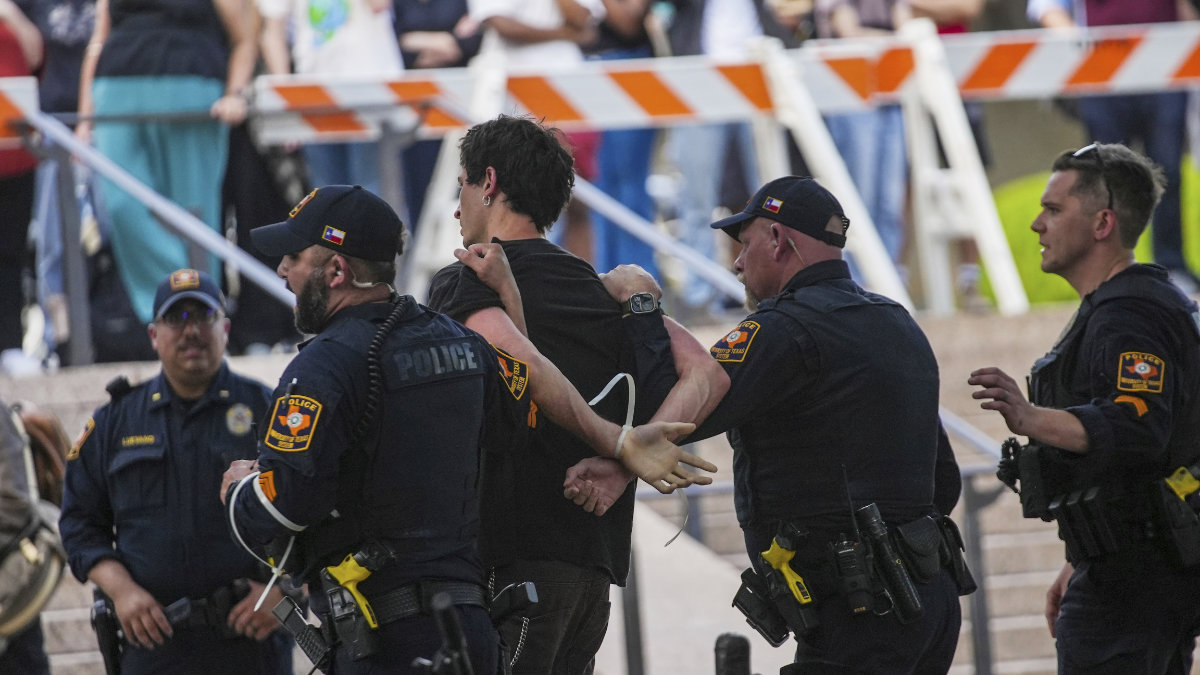
But prosecutors on Thursday dropped charges against most of the 60 people taken into custody, mostly on misdemeanor charges of criminal trespassing and disorderly conduct, and said they would proceed with only 14 of those cases.
In dropping the charges, the Travis County district attorney cited “deficiencies in the probable cause affidavits.”
‘Alarming reports’
Human Rights Watch and the American Civil Liberties Union have condemned the arrest of protesters and urged authorities to respect their free speech rights.
But some Republicans in Congress have accused university administrators of allowing Jewish students to be harassed, putting increasing pressure on schools to tightly control any demonstrations and to block any semi-permanent encampment.
US Education Secretary Miguel Cardona on Thursday said his department was closely monitoring the protests, including what he called “very alarming reports of antisemitism.”
In response, activist groups have strongly denied that the protests are antisemitic. Their aim is to pressure universities from divesting from companies that contribute to the Israeli military actions in Gaza, they say.
Even so, protest leaders have acknowledged that hateful rhetoric has been directed at Jewish students, but insist that people who tried to infiltrate and malign their movement are responsible for any harassment.

Friday deadline at Columbia
At Columbia, officials have given protesters until 4 a.m. on Friday to reach an agreement with the university on dismantling dozens of tents set up on the New York City campus in a protest that started a week ago.
An initial deadline of midnight Tuesday came and went without an agreement, but administrators extended it for 48 hours, citing progress in the talks.
The university already tried to shut the protest down by force. On April 18, Columbia President Minouche Shafik took the unusual move of asking police to enter the campus, drawing the ire of many rights groups, students and faculty.
More than 100 people were arrested and the tents were removed from the main lawn. But within a few days, the encampment was back in place, and the university’s options appeared to narrow.
Protesters have vowed to keep the protests going until their universities agree to disclose and divest any financial holdings that might support the war in Gaza, and grant amnesty to students suspended from school during the demonstrations.
Student protesters have also demanded that the US government rein in Israeli strikes on civilians in Gaza, which have killed more than 34,000 people, according to Palestinian health authorities. Israel is retaliating against an Oct. 7 Hamas attack that killed 1,200 people and led to 253 taken hostage, according to Israeli tallies.
India begins voting in second phase of election as Modi vs Gandhi campaign heats up
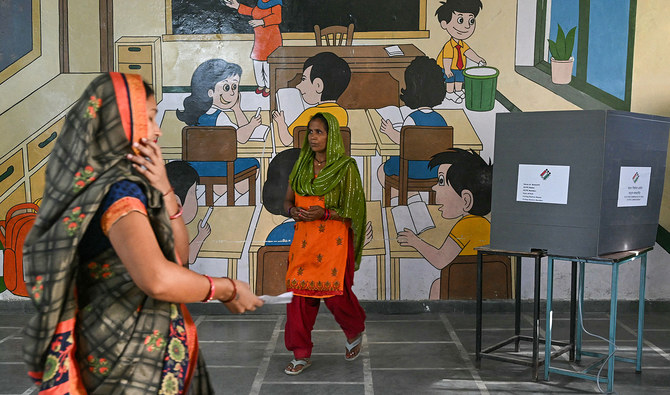
- Almost one billion people eligible to vote in seven-phase general elections that began on April 19 and concludes on June 1
- Modi is seeking record third straight term on the back of economic record, welfare measures, Hindu nationalism
BENGALURU/KOTTAYAM/MATHURA: India began voting on Friday in the second phase of the world’s biggest election, as Prime Minister Narendra Modi and his rivals raise the pitch of the campaign by focusing on hot-button issues such as religious discrimination, affirmative action and taxes.
Almost one billion people are eligible to vote in the seven-phase general elections that began on April 19 and concludes on June 1, with votes set to be counted on June 4.
Modi is seeking a record-equalling third straight term on the back of his economic record, welfare measures, national pride, Hindu nationalism and personal popularity. Surveys suggest he will easily win a comfortable majority.
His challengers have formed an alliance of more than two dozen parties and are promising greater affirmative action, more handouts and an end to what they call Modi’s autocratic rule.
Friday’s polling will be held for 88 of the total 543 seats in the lower house of parliament with 160 million people eligible to vote. It will be spread across 13 states and federal territories in the world’s most populous country.
More than half of those 88 seats are in the southern states of Kerala and Karnataka and the northwestern state of Rajasthan.
The campaign has changed tack since the first phase and become heated as Modi and the main opposition Congress party have faced off on communal issues with Modi accusing Congress of favoring minority Muslims, aiming to dilute affirmative action and planning to impose inheritance tax.
“Congress, which used to make noise in the name of the Constitution, has now been badly exposed for its hidden agenda,” Modi posted on X late on Thursday.
Congress has denied the charges and said Modi is distracting voters from real issues such as unemployment, price rise and rural distress and fears losing.
RAHUL GANDHI IN THE FRAY
“We spoke to you, we heard what was on your mind and drafted a revolutionary manifesto,” Congress leader Rahul Gandhi said in a video message on the eve of the vote. “This has been drafted by the Congress party but it is your voice.”
Gandhi, former Congress president and the face of the party, is among the 1200 candidates in the fray on Friday.
He is seeking re-election from Wayanad in Kerala and faces Annie Raja of the Communist Party of India (CPI) and BJP’s K. Surendran, among others, in the Left Front-ruled state.
In 2019, Gandhi defeated the CPI candidate by more than 400,000 votes, the highest margin in Kerala, although he lost his second seat to BJP in the family bastion of Amethi in north India. India allows a candidate to contest from more than one seat but they can retain only one if they win from more.
Congress slumped to a historic low when it was swept out of power by BJP in 2014 and won its second-lowest number of 52 seats in 2019, with Kerala contributing the highest of 15.
The party is also expected to do better in Karnataka where it won just one of 28 seats in 2019 but gained strength and defeated BJP in state elections last year.
It is still seen to be struggling nationally as bickering within the opposition alliance it leads and graft cases against some leaders has hobbled its challenge to Modi.
The Election Commission and political parties have been worried about voter turnout due to the summer heat and wedding season in some parts of the country with turnout falling to around 65 percent in the first phase from nearly 70 percent in 2019.
The poll panel has increased appeals for voter participation since, asking them to “vote with responsibility and pride.”
Ex-tabloid publisher testifies he scooped up possibly damaging tales to shield his old friend Trump
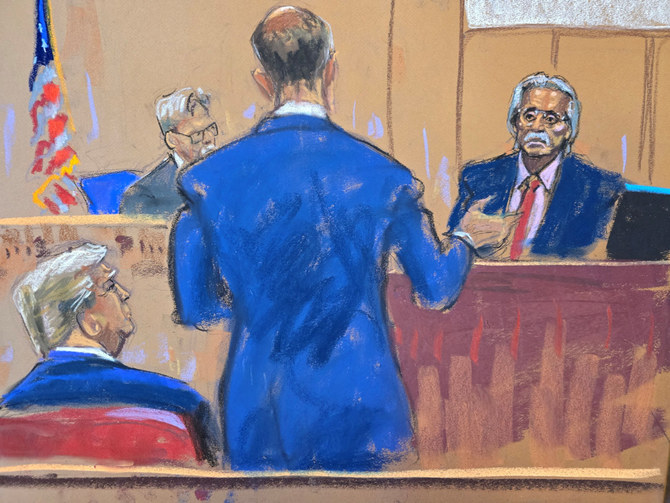
- David Pecker, publisher of the tabloid National Enquirer, has testified that his publication helped buy stories about Trump's extramarital affairs to keep them from getting out
- His testimony was a critical building block for the prosecution’s theory that their partnership was a way to illegally influence the 2016 presidential election
NEW YORK: As Donald Trump was running for president in 2016, his old friend at the National Enquirer was scooping up potentially damaging stories about the candidate and paying out tens of thousands of dollars to keep them from the public eye.
But when it came to the seamy claims by porn performer Stormy Daniels, David Pecker, the tabloid’s longtime publisher, said he put his foot down.
“I am not paying for this story,” he told jurors Thursday at Trump’s hush money trial, recounting his version of a conversation with Trump’s former lawyer Michael Cohen about the catch-and-kill scheme that prosecutors alleged amounted to interference in the race. Pecker was already $180,000 in the hole on other Trump-related stories by the time Daniels came along, at which point, he said, “I didn’t want to be involved in this.”
Pecker’s testimony was a critical building block for the prosecution’s theory that their partnership was a way to illegally influence the 2016 presidential election. The Manhattan district attorney is seeking to elevate the gravity of the history-making first trial of a former American president and the first of four criminal cases against Trump to reach a jury.
Trump’s lawyers also began their cross-examination of Pecker, using the time to question his memory of years-old events and to suggest his account had evolved over time.
But the hush money trial was just one of the consequential legal matters facing the Republican presidential candidate on Thursday.
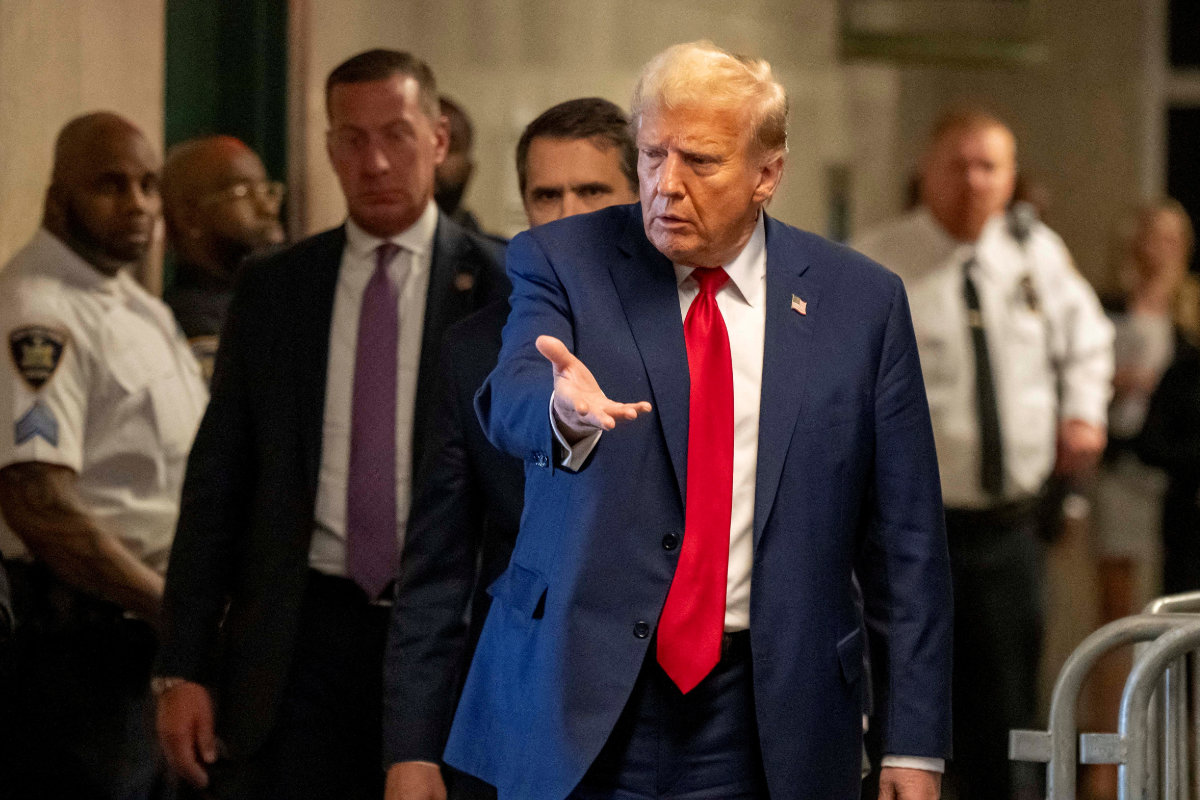
The US Supreme Court also heard arguments over whether Trump should be immune from criminal prosecution while he was the president, stemming from federal charges over his efforts to reverse his 2020 election loss to Joe Biden. The high court justices appeared likely to reject his claims of absolute immunity, though it seemed very possible that trial could be delayed beyond November’s election.
Trump’s many legal problems collided this week. The hush money case includes a looming decision on whether he violated a gag order and should be held in contempt. His former lawyers and associates were indicted in a 2020 election-related scheme in Arizona. And a New York judge rejected a request for a new trial in a defamation case that found Trump liable for $83.3 million in damages.
But the former president has a long history of emerging unscathed from sticky situations — if not becoming even more popular.
The Supreme Court’s decision will have lasting implications for future presidents, because the justices were seeking to answer the never-before-asked question of whether and to what extent does a former president enjoy immunity from prosecution for conduct during his time in office. But it may not impact the New York City case, which hinges mostly on Trump’s conduct as a presidential candidate in 2016 — not as a president.
Trump had asked to skip his New York criminal proceedings for the day so he could sit in on the Supreme Court’s special session, but that request was denied by Judge Juan M. Merchan, who is overseeing Trump’s trial on 34 felony counts of falsifying business records in connection with the hush money payments, which involved buying the rights to someone’s story but never publishing it.
“I think the Supreme Court has a very important argument before it today,” Trump said outside the courtroom. “I should be there.”
Instead, he sat at the defense table in a Manhattan courtroom with his lawyers, listening intently to Pecker testify how he and his publication parlayed rumor-mongering into splashy stories that smeared Trump’s opponents and, just as crucially, leveraged his connections to suppress unflattering coverage.
Trump has maintained he is not guilty of any of the charges, and says the stories that were bought and squelched were false.
“There is no case here. This is just a political witch hunt,” he said before court in brief comments to reporters.
As Pecker testified in a calm, cooperative tone about risque tales and secret dealings, the atmosphere in the utilitarian 1940s courtroom was one of quiet attentiveness. Two Secret Service agents were stationed in the first row of the courtroom gallery directly behind Trump. Ten court officers stood around the room. Jurors intently listened, and some took notes.
Pecker recalled that the publication bought a sordid tale from a New York City doorman and purchased accusations of an extramarital affair with former Playboy model Karen McDougal to prevent the claims from getting out. There was some talk of reimbursement from Trump’s orbit, but Pecker was ultimately never paid.
The breaking point came with Daniels, who was eventually paid by Cohen to keep quiet over her claim of a 2006 sexual encounter with Trump. The ex-president denies it happened.
Pecker recalled to the jury that he was dining with his wife the night after the public learned of the infamous 2005 “Access Hollywood” tape in which Trump discussed grabbing women sexually without permission, when then-editor Dylan Howard called with an urgent matter.
Howard said he heard from Daniels’ representatives that she was trying to sell her story and that the tabloid could acquire it for $120,000, Pecker told jurors. Pecker was tapped out; he told Cohen as much.
At the same time, Pecker advised that someone — just not him — should do something to prevent the story from going public.
“I said to Michael, ‘My suggestion to you is that you should buy the story, and you should take it off the market because if you don’t and it gets out, I believe the boss will be very angry with you.’”
Cohen followed his advice.
Pecker testified that Trump later invited him to a White House dinner in July 2017 to thank him for helping the campaign. The ex-publisher said Trump encouraged him to bring anyone he wanted, recounting that the then-president told him, “It’s your dinner.”
Pecker said that he and Howard, as well as some of his other business associates, posed for photos with Trump in the Oval Office. Pecker said others at the dinner included Trump son-in-law Jared Kushner and press adviser Sean Spicer.
At one point during the evening, Pecker said Trump asked him for an update on Karen McDougal.
“How’s Karen doing?” he recalled Trump saying as they walked past the Rose Garden from the Oval Office to the dining room.
“I said she’s doing well, she’s quiet, everything’s going good,” Pecker testified.
But months later, in March 2018, the president became furious when McDougal gave an interview to CNN’s Anderson Cooper, Pecker testified.
“I thought you had and we had an agreement with Karen McDougal that she can’t give any interviews or be on any TV channels,” Trump told Pecker by phone, the former National Enquirer publisher said.
He said he explained to the then-president that the agreement had been changed to allow her to speak to the press after a November 2016 Wall Street Journal article about the tabloid’s $150,000 payout to McDougal.
“Mr. Trump got very aggravated when he heard that I amended it, and he couldn’t understand why,” Pecker told jurors.
Later, Trump defense attorney Emil Bove opened his cross-examination by grilling Pecker on his recollection of specific dates and meanings. He appeared to be laying further groundwork for the defense’s argument that any dealings Trump had with the National Enquirer publisher were intended to protect himself, his reputation and his family — not his campaign.
In other developments, prosecutors argued Trump again violated a gag order, all while waiting to hear whether he would be held in contempt on other suspected violations. Merchan has barred the GOP leader from making public statements about witnesses, jurors and others connected to the case. He set a hearing for next Thursday on the new claims.
Trump was dismissive about the looming decision. When asked by reporters if he would pay fines if ordered, he replied, “Oh, I have no idea.” He then said, “They’ve taken my constitutional right away with a gag order.”
A conviction by the jury would not preclude Trump from becoming president again, but because it is a state case, he would not be able to pardon himself if found guilty. The charge is punishable by up to four years in prison — though it’s not clear if the judge would seek to put him behind bars.
Xi tells Blinken US, China must be ‘partners, not rivals’: state media
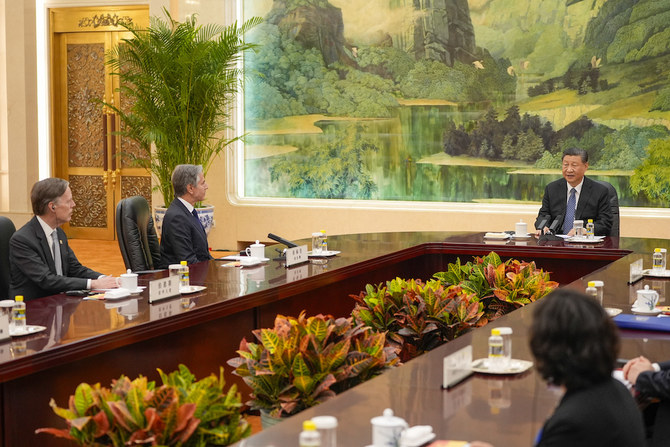
BEIJING: Chinese President Xi Jinping on Friday told top US diplomat Antony Blinken that the world’s two biggest economies should be “partners, not rivals,” adding that there were a “number of issues” to be resolved in their relations.
“The two countries should be partners, not rivals,” Xi said, according to state broadcaster CCTV, adding: “There are still a number of issues that need to be resolved, and there is still room for further efforts.”
China urged Blinken to address rising disagreements or risk a “downward spiral” between the two powers as talks opened in Beijing.
Blinken, paying his second visit to the rival country in less than a year, voiced hope for progress but said he would directly raise areas of difference, which are expected to include Russia, Taiwan and trade.
Chinese Foreign Minister Wang Yi, receiving Blinken at the Diaoyutai state guesthouse in the capital’s ancient gardens, said relations between the world’s two largest economies were “beginning to stabilize” after leaders Joe Biden and Xi Jinping met at a November summit.
“But at the same time, the negative factors in the relationship are still increasing and building,” Wang said.
“The relationship is facing all kinds of disruptions. China’s legitimate development rights have been unreasonably suppressed and our core interests are facing challenges,” he said.
“Should China and the United States keep in the right direction of moving forward with stability, or return to a downward spiral?
“This is a major question before our two countries and tests our sincerity and ability.”
Blinken’s aides previously said he would address a range of concerns including China’s support for Russia, which has rapidly rebuilt its military base two years into its invasion of Ukraine.
As he opened the meeting with Wang, Blinken said he would be “very clear, very direct,” but added: “I hope we make some progress on the issues our presidents agreed” on.
The two countries should be as “clear as possible about the areas where we have differences — at the very least to avoid misunderstandings, to avoid miscalculations,” Blinken said.
“That really is a shared responsibility that we have not only for our own people, but for people around the world.”




